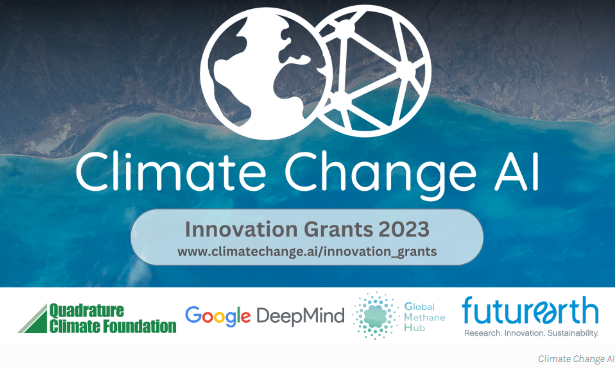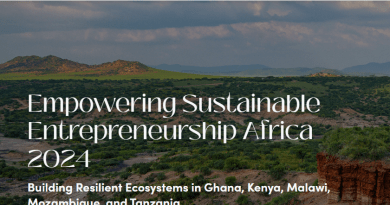Apply now for the Climate Change AI Innovation Grants (Up to $150,000 grant)
The Climate Change AI Innovation Grants aims to support the use of Artificial Intelligence (AI) and Machine Learning (ML) in addressing climate change challenges across various sectors such as energy, agriculture, forestry, climate modeling, and disaster response. However, the lack of data, infrastructure, and knowledge transfer between fields has hindered impactful research and deployment in this area.
The relationship between AI and climate change is complex and can either contribute to or counteract climate action. Therefore, the application of AI in climate initiatives must prioritize considerations of impact, responsibility, and equity.
Thanks to the Quadrature Climate Foundation, Google DeepMind, and Global Methane Hub, we are pleased to announce funding of up to USD 1.4M for projects at the intersection of AI and climate change. We also appreciate the Canada Hub of Future Earth for acting as the fiscal sponsor for this program.
Quick facts – Climate Change AI Innovation Grants
- Grant amount: Up to USD 150K per proposal, for projects of 12 months in duration. We will award a total of up to USD 1.4M in grants across all projects.
- Scope: Projects at the intersection of AI/machine learning and climate change.
- Eligibility: Principal Investigator must be affiliated with an accredited university in one of the 38 OECD Member Countries (see list here). Co-Investigators can be located outside OECD Member countries and can be affiliated with non-research institutions, and there is no limit on the fraction of funding allocated to Co-Investigators.
- Proposal submission deadline: September 15, 2024 at 23:59 (Anywhere on Earth time, UTC-12)
- Submission site: https://cmt3.research.microsoft.com/CCAIGrants2024
- Contact: [email protected]
Grant Details: Climate Change AI Innovation Grants
This program will provide grants of up to USD 150K for projects lasting one year.
Grantees are required to publish a documented dataset (or simulator) that complies with the FAIR Data Principles. Projects should lead to a deployed initiative, scientific publications, or other forms of public dissemination of results, with a clear pathway to impactful deployment. All grant IP, including datasets and trained models, should be carefully documented for transparency and reproducibility must be made publicly available under an open license.
This year, there are two special tracks in addition to the main track. Submissions should be made to one of these three tracks (duplicate submissions made to multiple tracks may be disqualified). Climate Change AI may move submissions between tracks at the discretion of the Process Chairs.
Main Track – Climate Change AI Innovation Grants
Projects in the Main Track should utilize AI or machine learning to tackle issues in climate change mitigation, adaptation, or climate science, or consider problems related to impact assessment and governance at the intersection of climate change and machine learning.
Relevant topics include but are not limited to the following:
– ML to aid mitigation approaches in relevant sectors such as agriculture, buildings and cities, heavy industry and manufacturing, power and energy systems, waste, transportation, or forestry and other land use
– ML applied to societal adaptation to climate change, including disaster prediction, management, and relief in relevant sectors
– ML for climate and Earth science, ecosystems, and natural systems as relevant to mitigation and adaptation
– ML for R&D of low-carbon technologies such as electrofuels and carbon capture & sequestration
– ML approaches in behavioral and social science related to climate change, including those anchored in climate finance and economics, climate justice, and climate policy
– Projects addressing AI governance in the context of climate change, or that aim to assess the greenhouse gas emissions impacts of AI or AI-driven applications, may also be eligible for funding. (Studies addressing this area may be exempt from the dataset publication requirement.)
For context, a list of the projects funded during past Innovation Grants cycles is available here.
Special Track on Methane – Climate Change AI Innovation Grants
The Special Track on Methane invites submissions that utilize AI or machine learning to tackle issues related to methane and climate change mitigation in the near future (well before 2040). This includes addressing topics such as energy (covering coal mine methane, ventilation air methane, flaring, methane leak detection, super-emitters, and methane emissions from oil and gas), waste and circular economy (involving food loss and waste recovery, food or organic waste separation, dumps/landfill emissions, wastewater treatment, and sludge management), and agriculture (encompassing livestock, manure management, biomass burning, and rice cultivation).
Special Track on Dataset Gaps – Climate Change AI Innovation Grants
1. Submissions to the Special Track on Dataset Gaps should focus on creating a documented dataset or simulator by compiling, labeling, and/or annotating existing data, or by collecting, simulating, or making available new data. The topics addressed by the dataset or simulator should align with the Main Track submissions, and applicants should emphasize the specific gap in dataset availability that the project aims to address, and its importance for climate change mitigation or adaptation.
2. The Special Track on Dataset Gaps also allows proposals to request support from a Google DeepMind researcher, in addition to the financial award. Applicants interested in this option should indicate this in the CMT submission form.
3. It is important to note that proposals in the Special Track on Dataset Gaps may also propose research leveraging the dataset or simulator as part of the project, but the primary focus should be on creating the dataset or simulator itself. In contrast, projects in the Main Track must release a dataset or simulator, but this does not need to be the primary focus of the project.
Eligibility – Climate Change AI Innovation Grants
Each submission must include a Principal Investigator (PI) who is associated with an accredited university in one of the 38 OECD Member Countries (refer to the list provided). The PI must meet the criteria to secure grants under their own name at their accredited university; this could involve faculty members, postdoctoral researchers, or research scientists (depending on the institution). Co-Investigators are allowed to be based outside OECD Member countries and can be affiliated with non-research institutions. Collaborations involving multiple countries and sectors are encouraged. However, Co-Investigators cannot be associated with an organization listed on the Consolidated Screening List or an organization in a sanctioned country (refer to FAQ for more details).
Current members of the Climate Change AI Board of Directors and Climate Change AI staff are not eligible to apply for this grant as a PI, and they are not permitted to receive funding for their own salaries. Program Chairs and Meta-Reviewers for this grant are also not allowed to apply for or receive funds in any capacity (although Reviewers are exempt, and conflicts of interest will be managed appropriately during the review process).
We do not provide funding for research projects that are already being funded by other grant programs. If other grant proposals have been submitted or are being considered for the same project, the relationship between the current proposal and those others must be clearly outlined. If the proposal is chosen for funding, no part of the project should receive double funding from other funding sources.
Timeline – Climate Change AI Innovation Grants
| Activity | Date |
|---|---|
| Call release date | July 14, 2024 |
| Informational webinars | July 30, 2024 @ 9 am ET/1 pm UTC register August 15, 2024 @ 12 pm ET/5 pm UTC register |
| Proposal submission deadline | September 15, 2024 |
| Notification of results | December 2024 |
| Award start date | February 2025 |
| Award end date | February 2026 |
Selection criteria
Proposals will undergo a single-blind review process conducted by independent reviewers.
Projects will be assessed based on the following criteria:
– Relevance to climate change: Projects must establish a clear connection to climate change mitigation and/or adaptation. This can encompass various topics related to climate change, but the link to climate change must be explicitly stated.
– AI/ML relevance: Projects should incorporate AI or ML in a well-justified and well-defined manner within the context of the problem. This includes projects where AI or ML play a central role, as well as those where they are just one aspect. Projects suggesting the use of AI/ML techniques will not be penalized if alternative methods are deemed more suitable during the project; negative outcomes are accepted if rigorously tested.
– Dataset: The proposed dataset or simulator should facilitate further impactful research at the intersection of climate change and machine learning beyond the proposed project. The dataset must adhere to the FAIR Data Principles (Findable, Accessible, Interoperable, and Reusable).
– Pathway to impact: Proposals should outline how their work, if successful, can be implemented to support climate mitigation and/or adaptation efforts. This can involve planned deployments within the project or a detailed strategy for disseminating the work to relevant sectors or organizations.
– Ethics: Proposals must address ethical considerations and implications of the work. This includes discussing relevant stakeholders, equity considerations, and potential negative social or environmental impacts of the proposed solution, along with strategies to avoid or mitigate these risks during project execution. (Refer to the NeurIPS ethics guidelines for further guidance.)
Feasibility: The proposed project’s scope should align realistically with the designated timeline and budget.
Expertise of team: The team put forward should showcase proven expertise in areas relevant to their project’s development and execution, particularly in climate change mitigation and adaptation, as well as AI/ML. The presence of interdisciplinary and diverse team members will be positively considered.
Moreover, the following factors will be viewed favorably during the evaluation process:
Deployment partners: Projects that involve relevant organizations capable of impactful deployment will be looked upon favorably.
Under-funded areas of work: Priority will be given to projects that are impactful but may not typically receive funding from other sources. This includes projects that do not neatly fit into a single discipline or serve stakeholders with limited access to financial resources.
Equity: Projects that explicitly integrate equity considerations, such as the choice of problem addressed or the stakeholders involved, will be viewed positively.
In selecting grant recipients, we will aim to distribute grants across various sectors of climate change mitigation and adaptation, as well as ensure coverage across diverse geographic regions within the grantee cohort.
APPLICATION INSTRUCTIONS – Climate Change AI Innovation Grants
All applications must be submitted by September 10th, 2024, at 23:59 (Anywhere on Earth time, UTC-12). To apply, please visit the CMT website and provide the required information.
Basic information includes the title and abstract of the proposal, the name, affiliation, and country of the Principal Investigator’s institution, as well as the names, affiliations, and countries of all co-Investigators. Declarations about the project are also necessary. The first author listed in CMT will be considered the Principal Investigator. Only one Principal Investigator can be named, but there is no limit on co-Investigators. The institution of the Principal Investigator will determine eligibility and handle fund distribution if a grant is awarded.
For the Project Description, provide a detailed description of the project (maximum 12 pages with 12pt font, single line spacing, and 1-inch margins), with additional pages allowed for references. Submit the Project Description as a PDF attachment via CMT, following the specified subsections:
– Project title, Principal Investigator’s name and affiliation, and co-Investigators’ names and affiliations.
– Summary: A brief description of the project in up to 250 words.
– Project Outline: Detailed description of the project, including methodology (e.g., machine learning) and application area (climate change). Explain how the project addresses gaps in climate change mitigation or adaptation and why the chosen methodology is suitable.
Deliverables: An outline of the specific items to be delivered as project outcomes, such as research papers, software code, datasets, or operational systems.
Timeline: A schedule detailing the key milestones of the project in conjunction with the aforementioned deliverables.
Team: An overview of the expertise possessed by each team member and how their skills and knowledge are relevant to the project’s objectives.
Pathway to Impact: A strategy detailing how the project will contribute to reducing greenhouse gas emissions or enhancing societal resilience to climate change. This plan should include engagement with end users and stakeholders, identification of target beneficiaries, the practical utility of the project for these stakeholders, and considerations necessary for successful implementation.
Dataset Plan: A proposal for a new dataset to be generated and shared in accordance with the FAIR Data Principles. This section should describe the dataset’s purpose, unique contributions compared to existing datasets, methods for dataset creation, and a comprehensive plan for documentation, sharing, and preservation to ensure compliance with FAIR principles.
Equity Considerations: This section should outline the equity-related factors relevant to the project and how the team plans to incorporate these considerations into the project. This may involve discussing the research’s nature, the team’s composition, and the involvement of external stakeholders.
Ethical Considerations: This section should address broader ethical considerations linked to the project’s development and implementation, including those related to climate change. It should cover potential societal impacts or unintended consequences, as well as strategies to mitigate negative effects and key stakeholders to engage with.
Budget and Budget Justification: Provide an itemized Budget (1 page) detailing the total amount requested and the allocation of funds if the grant is approved, along with a brief Budget Justification (1 page) explaining these expenses. Eligible costs include salaries for Investigators, students, research staff, materials, equipment, software, compute, conference expenses, and project-related travel. The Budget should specify any institutional overhead, capped at 10% of the total amount requested. Clearly indicate which research activities will be funded by the grant and any other funding sources. Note that funds will be disbursed to the Principal Investigator’s university, with any further distribution to partner institutions managed by the lead institution.
CVs of key personnel: Submit CVs for the Principal Investigator and all co-Investigators in a single PDF file (no page limit).





